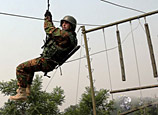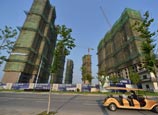
Edited and translated by Liang Jun, People's Daily Online
Solving the Syrian crisis will require patience and perseverance. It is a complex, sensitive, and multi-dimensional problem. The road to a political solution will not be smooth, but this is the direction we must take, and our objectives must be clear.
Recently, the United States claimed that Syria had crossed its "red line" by employing chemical weapons against opposition forces. America is now moving forward with a plan to provide arms to Syrian rebels. Prior to this, the U.S. had taken the decision to keep F-16 fighter jets and Patriot missile systems in Jordan which had been dispatched there for military exercises, and the European Union has also decided to lift its arms embargo on the Syrian opposition.
Based on the relevant international laws and United Nations Security Council resolutions, it is for the UN to conduct an objective investigation into alleged use of chemical weapons in Syria. China will stand in firm opposition to any party found to have used such weapons.
Earlier last month, the United States and Russia proposed a second conference on Syria in Geneva. Obviously, the external environment to political settlement of the Syria crisis is evolving.
Over the past two years, the Syrian civil war has killed more than 90,000 people and driven millions from their homes. The refugee problem is becoming more severe by the day, and ethnic fissures are getting wider. Sectarian conflict is on the rise, fueled by the growing presence of terrorist extremists.
The Syrian crisis has long reached out beyond its own borders, becoming a major threat to regional peace and stability.
What is the solution to the crisis in Syria? One thing is clear: the problem will not be solved through the use of force. Political settlement, supported by international consensus, is the only way.
If we have learned anything from modern history, it must be that more bloodshed will only exacerbate the situation. Recent foreign military intervention in the Middle East has led only to greater chaos, with a negative impact on the host country, on the regional situation, and on the intervening states themselves.
At the end of June 2012, the Action Group for Syrian Final Communiqué put forward proposals for a political solution to the Syrian civil war. Right now the international community needs to be making careful preparations for the second meeting in Geneva to promote talks between the Syrian government and the rebels, and to help the people of Syria determine their own future and destiny.
Solving the Syrian crisis will require patience and perseverance. It is a complex, sensitive, and multi-dimensional problem. The road to a political solution will not be smooth, but this is the direction we must take, and our objectives must be clear.
From the six points of UN envoy Kofi Annan's peace plan for Syria to the four-point peace plan, from the UN Security Council to the Palais des Nations in Geneva, China is and always has been a dedicated advocate and a staunch promoter of a political settlement for the Syrian issue.
China has recently expressed its hopes that all parties involved will seize the opportunities at hand, moving forward as one to achieve success at the second conference in Geneva, promoting the process towards a political solution to the Syria crisis, and avoiding any moves which might result in further military action in Syria. Through the joint efforts of the international community, there is still time to prevent the Syrian tragedy from getting even worse.
Read the Chinese version: 坚持政治解决叙利亚问题
















 Controversial audition for 'rich blind date' -- being pretty is just not enough
Controversial audition for 'rich blind date' -- being pretty is just not enough


![]()
